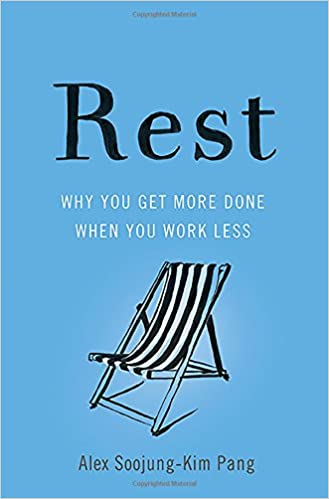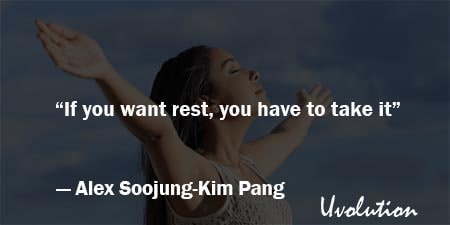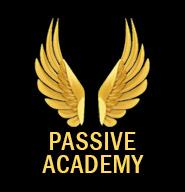Rest by Alex Soojung Kim Pang Summary
The Book in 1 Sentences
“I argue that we misunderstand the relationship between work and rest. Work and rest are not polar opposites. You cannot talk about rest without also talking about work. Writing about only one is like writing a romance and naming only one of the lovers.
Rest is not work’s adversary. Rest is work’s partner. They complement and complete each other.
Further, you cannot work well without resting well. Some of history’s most creative people, people whose achievements in art and science and literature are legendary, took rest very seriously. They found that in order to realize their ambitions, to do the kind of work they wanted to, they needed rest.
The right kinds of rest would restore their energy while allowing their muse, that mysterious part of their minds that helps drive the creative process, to keep going.
So work and rest aren’t opposites like black and white or good and evil; they’re more like different points on life’s wave. You can’t have a crest without a trough. You can’t have the highs without the lows. Neither can exist without the other.” ~ Alex Soojung-Kim Pang
6 BIG Ideas
Rest: Why You Get More Done When You Work Less
Summary
1. Default Mode Network (DMN)
“These studies convinced ... neuroscientists that the resting brain isn’t inactive. The brain
automatically switches on a default mode network (DMN), a series of interconnected sections that activate as soon as people stop concentrating on external tasks, and shifts from outward-focused to inward-focused cognition.
As they’ve explored it further, scientists have realized that the DMN and resting state are doing critical work on our behalf. ...
In other words, a set of activities that we’re not conscious of (pretty much by definition), and
which we didn’t even know existed until the 1990s, turns out to be implicated in just about
every significant cognitive and emotional activity.
Intelligence? Check. Moral and emotional judgment? Check. Empathy? Check. Sanity? Check.
That’s a lot of benefit for something we call ‘rest.’ And if your ‘resting’ brain is much more active than you realize, giving your brain the right kinds of ‘rest’ is critical to its development, health, and productivity.”
“Just as great athletes seem able to draw on reserves of energy that the rest of us cannot or are more effective at getting oxygen to tired brains and muscles, so too do the DMNs of creative people have stronger connections between areas associated with functional abilities like verbal acuity, visual skill, and memory, connections that allow their brains to keep working on problems when in the resting state.”
2. Creativity = Work (4 hours of deep, focused work)+ Rest
“When you examine the lives of history’s most creative figures, you are immediately confronted with a paradox: they organize their lives around their work, but not their days.
Figures as different as Charles Dickens, Henri Poincaré, and Ingmar Bergman, working in
disparate fields in different times, all shared a passion for their work, a terrific ambition to
succeed, and an almost superhuman capacity to focus.
Yet when you look closely at their daily lives, they only spent a few hours a day doing what we would recognize as their most important work. The rest of the time, they were hiking mountains, taking naps, going on walks with friends, or just sitting and thinking.
Their creativity and productivity, in other words, were not the results of endless hours of toil. Their towering creative achievements result from modest ‘working’ hours. ...
If some of history’s greatest figures didn’t put in immensely long hours, maybe the key to unlocking the secret of their creativity lies in understanding not just how they labored but how they rested, and how the two relate.”
“This is how we’ve come to believe that world-class performance comes after 10,000 hours of practice. But that’s wrong. It comes after 10,000 hours of deliberate practice, 12,500 hours of deliberate rest, and 30,000 hours of sleep.”
3. Morning Routine (Early Start)
“An early start also opens space in your day for rest and allows you to establish a clean division between working and resting time. One should ‘either work all out or rest completely,’
Cambridge mathematician John Littlewood advised.
Even for people whose minds naturally gravitate to their work, having clear boundaries between periods of work and rest allows them to get more from each. ‘It is too easy, when rather tired, to fritter a whole day away with the intention of working but never getting properly down to it,’ Littlewood said.
‘This is pure waste, nothing is done, and you have had no rest or relaxation.’ Virtually every prolific author and scientist would agree.
A day that starts with work creates rest that can be enjoyed without guilt. When you start early, the rest you take is the rest you’ve earned.”
“Scott Adams, the creator of Dilbert, works about four hours a day on the strip and other writing; as he points out, ‘My value is based on my best ideas in any given day, not the number of hours I work.’ Stephen King describes four to six hours of reading and writing as a ‘strenuous’ day.”
4. Walk!
“For many thinkers and doers, a walk is an essential part of their daily routine, a source of exercise and solitude.
Thomas Jefferson advised his nephew to walk for mental relaxation and for physical endurance and added, ‘Never think of taking a book with you. The object of walking
is to relax the mind [and] divert your attention by the objects surrounding you.’
Jefferson practiced what he preached, walking in the mornings before breakfast ‘to shake off sleep,’ taking five-mile tramps around Paris during his posting as ambassador, and, as president, reserving time during the afternoon for walking or riding.”
“Ernő Rubik made the critical design breakthrough that yielded the Rubik’s Cube while walking along the River Danube.”
“The uncertainty principle came to Werner Heisenberg during a late-night walk in Copenhagen in 1927. Heisenberg had been struggling with the fact that the equations he had developed could precisely predict the momentum of a particle but not its position. While walking in Fælled Park, he had an insight: what if there was no problem with the mathematics or the models? What if this uncertainty was actually a property of particles?”
“Busy people need to cultivate forms of rest, he [Churchill] began, but are temperamentally unable to simply do nothing. ‘It is not enough merely to switch off the lights which play upon
the main and ordinary field of interest,’ he argued. ‘A new field of interest must be illuminated.’ Fortunately, ‘the tired parts of the mind can be rested and strengthened, not merely by rest, but by using other parts.’”
5. Exercise
“Running seems to be particularly effective in stimulating neurogenesis.” Why? Well: “Aerobic activity is beneficial in several ways.
Exercise strengthens your cardiovascular system and improves your circulation, which means your body can deliver more blood to your brain when it’s working. ... A firing neuron uses as much energy as a leg muscle cell during a marathon.
Further, sustained aerobic exercise stimulates the body to generate more small blood vessels in the brain, and a better-developed cerebral vasculature can deliver blood to the brain faster and more effectively.
A 2012 study found that episodic memory improves as maximal oxygen capacity increases. (Conversely, comparative studies of adults who do and don’t exercise find that couch potatoes have lower scores on tests of executive function and processing speed and in middle age have faster rates of brain aging and memory decline.)”
6. Deep Play
“For creative and prolific people, seeing outside activities as expressions of the same interests
that guide their professional lives builds a bridge between the worlds of work and rest and
helps turn these activities into deep play.
For Michelson and other creative figures, deep play didn’t compete with work; it was a way to express the same fascination with nature, need to challenge ones’ self, and passion for focus and concentration and problem-solving.
Seeing them as connected helps turn what could be seen as a time-wasting distraction into an important, valuable part of their lives. It helps justify pursuing these activities even if they’re time-consuming.”
Deep play “provides a way to unify what might otherwise be disparate and scattered activities into a unified whole, a life that is greater than the sum of its parts.”
That was my QUICK summary of the great book Rest by Alex Soojung Kim Pang. If you’re interested, get your copy. There is a HUGE amount of life-changing ideas in this book, and we’ve only touched on a tiny bit of it.
Buy The Book: Rest by Alex Soojung Kim Pang

GET Blinkist 7 Days FREE Trial
3000+ Book Summaries
(Audio and Text)







